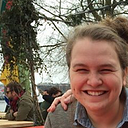Take 91: E.T. the Extra Terrestrial
In July of 2015, the BBC released a list of the 100 Greatest American Films, curated by polling critics all over the world. I’m watching them and writing about them as a form of self taught film school. This week… we’re doing number 91, Steven Spielberg’s E.T. the Extra Terrestrial. As always, there will be spoilers.
I, of course, watched Stephen Spielberg’s E.T. the Extra-Terrestrial when I was growing up. It came out in 1982, I was born in 1988, and I have no memory of my first time I saw the film. I don’t remember what it felt like to see the creature for the first time or watch Elliot streak across the moon on his bicycle. I had a long drought between viewings during the aughts when it started to feel passe and juvenile, and I developed a preference for more 2000 styled outer space content. I re-watched the movie somewhat reluctantly when my niece was about five and it became the movie she watched obsessively and begged for, and I felt newly captivated by the journey with fresh adult eyes.
I remember after the rewatch actively telling my friends, “you know, E.T. is actually a pretty good movie” and receiving a wide array of responses, mostly I think there were shrugs of agreement (or disinterest). I realized then that the lore of the film had become such a part of me that I had never really seen the movie, I had only experienced it in feelings. This is a special kind of magic that some special children’s media and literature can evoke — the capacity to work every shade on the spectrum of age and to find a point of resonance that is hardly predictable — in this case ranging from Drew Barrymore as a pre-k Gertie, Henry Thomas as a late elementary school aged boy, Robert MacNaughton as Mike, a young teenaged older brother, and their mom, Dee Wallace as Mary.
When I was Gertie’s age I saw the movie as her, barely perceiving the plot and when I was Elliot, I longed for the otherworldly adventure he was experiencing. I skipped over my Mike aged viewing, and now here we are, when I’m closer in psyche to the mom than any other character. Spielberg flexes this particular versatility the most in E.T.. It surfaces in other films, like Jurassic Park, but this is the film where his talents for mood and point of view really surface. The shots are often low, the height of a four foot alien or a young boy. This is Elliot’s story and it’s told with little exposition -details are suggested and hinted at at times, and dropped into startling focus at others.
Not only does the camera reflect Elliot and E.T.’s shared vantage point, Spielberg also uses the lighting and contextual elements to mimic their common state of limited understanding. There are dark spots in their comprehension of the world around them that illuminate slowly as they grow into familiarity with one another. One of those dark spots I didn’t notice until this viewing was the spectre of divorce and how Elliot’s psychic state could have been impacted when he bid goodbye to E.T., and his grief and loss was compounded. Spielberg played with extraterrestrials from an adult perspective in another film on this list, 1977’s Close Encounters of the Third Kind, and I wonder how much of this film was an adjacent attempt at a similar tale without the encumberment of adulthood. That’s not to say that Elliot is burdenless, but it’s a shifted burden that is at once more raw and sheltered.
Of course, those are threads in the film that I can only pull out with Mary’s perspective. The movie still packs a punch and my heart still leaps when the bicycles climb into the sky because my Gertie is still deep within me. But it’s tempered and nostalgic, a chord that the creators of Stranger Things would strum in 2016 when they excavated the 80’s teen adventure formula. I don’t know if E.T. was the first to establish this format but it’s the earliest I can remember, and was followed by The Goonies, Stand By Me, and Labyrinth, where free range parenting in a magical world could lead to wild romps and unexpected coming of age.
I wonder how many more times I’ll watch this film, and I wonder how my perspective will shift every time. I hope I watch it again alone and recognize how much I’ve changed in the process; and I hope I watch it again with children so that I can experience that magical discovery through the eyes of a new generation. Long live E.T..
